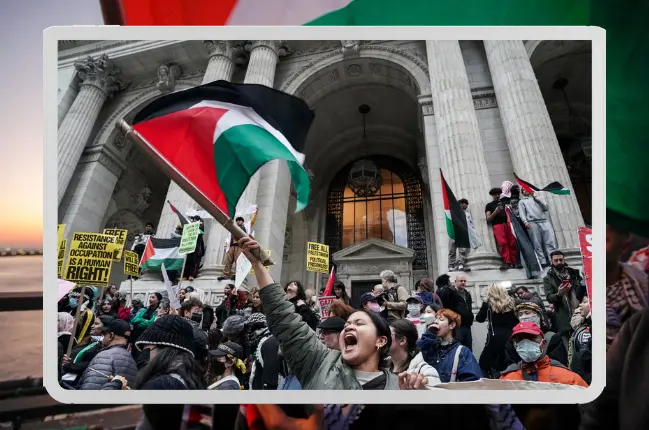As the recent attacks in Gaza continue to escalate, student protesters around the world are raising their voices in solidarity with the Palestinian people. However, their demonstrations are met with a crackdown from authorities, sparking a contentious debate over the balance between maintaining order and upholding the right to protest.
The crackdown on student protesters over the Gaza conflict raises significant questions about the role of dissent in times of crisis. On one hand, governments have a responsibility to ensure public safety and prevent the escalation of violence during protests. On the other hand, stifling dissent through repression and censorship undermines the very principles of democracy and human rights that these governments claim to uphold.
Student Protesters Stand with recent attacks in Gaza
The ongoing recent attacks in Gaza have evoked strong emotions and impassioned responses from students and activists globally. Many see the Israeli military actions as disproportionate and in violation of international law, resulting in civilian casualties and widespread suffering. In response, students are taking to the streets, organizing rallies, and staging sit-ins to express their solidarity with the people of Gaza and demand an end to the violence.
Yet, these expressions of dissent are often met with heavy-handed tactics from authorities. Police forces deploy tear gas, water cannons, and arrests to disperse protesters, citing concerns over public safety and the need to maintain order. Critics argue that such measures infringe upon the fundamental right to freedom of speech and assembly, essential pillars of democratic societies.
The escalation of violence in Gaza has sparked outrage and despair among students globally, who witness with horror the devastation inflicted upon innocent civilians, including children, families, and essential infrastructure. From university campuses to city streets, student activists are mobilizing in solidarity with Palestinians, demanding an end to the military aggression and the restoration of peace and justice in the region.
The significance of student-led protests against Israeli attacks in Gaza extends beyond the immediate context of the conflict. It reflects a broader awakening among young people to the interconnectedness of global struggles for justice and human rights. As they raise their voices in solidarity with Palestinians, students are also challenging systems of oppression, colonialism, and militarism that perpetuate violence and injustice around the world.
Moreover, the targeting of student activists sends a chilling message to young people who are passionate about social justice and global solidarity. When authorities suppress peaceful protests, they not only silence voices of dissent but also discourage future civic engagement and activism. This erosion of democratic values poses a threat to the fabric of society and undermines efforts to foster dialogue and understanding.
In response to the crackdown, civil society organizations and human rights advocates are calling for respect for the rights of protesters and urging authorities to engage in dialogue rather than resorting to violence. They emphasize the importance of allowing peaceful demonstrations to take place and facilitating open discussions about the root causes of the recent attacks in Gaza and potential pathways to peace.
However, the crackdown on student protesters represents a critical juncture in the ongoing struggle between authority and dissent. While maintaining public order, it must not come at the expense of fundamental rights and freedoms. Governments and institutions must recognize the legitimate grievances driving these protests and engage with students in good faith to address them. Only through genuine dialogue and respect for democratic principles can societies navigate these challenges and forge a path towards a more just and equitable future.
In conclusion, the crackdown on student protesters over the Gaza conflict highlights the delicate balance between maintaining order and respecting the right to protest. While student protests against Israeli attacks in Gaza represent a powerful expression of solidarity, compassion, and resistance to injustice. As young people continue to mobilize for peace and justice, their activism serves as a beacon of hope for a better future in the Middle East and beyond. Whereas, governments have a duty to ensure public safety, they must not use excessive force to silence dissenting voices.
Instead, they should engage with protesters in constructive dialogue and address the underlying grievances driving these demonstrations. Only through genuine engagement and respect for democratic principles can societies navigate conflicts and build a more just and equitable world.


